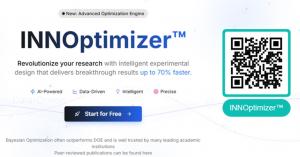SynSilico® launches INNOptimizer™ test version - a powerful web-based Bayesian Optimization tool for smarter R&D
INNOptimizer is using latest Bayesian Optimization algorithms and a broad set of analytical tools to guide optimizations with minimum experimentation needed.
Accessible at optimizer.synsilico.com, INNOptimizer™ provides users with an intuitive and configurable platform that integrates advanced analytics, to guide data-driven experimental design strategies. The tool is especially well-suited for applications in Quality by Design (QbD) studies, offering unparalleled insights into design spaces and the complex relationships between input variables and performance/quality outcomes.
Accelerate Innovation with Bayesian Intelligence:
At its core, INNOptimizer™ uses Bayesian Optimization, a probabilistic model-based approach to guide experimental design intelligently and efficiently. This methodology excels in situations where experiments are expensive, time-consuming, or resource-intensive, making it ideal for scientific research, product development, and process optimization.
By modeling the behavior of systems and continuously learning from results, INNOptimizer™ proposes the most promising experimental conditions to test next. This reduces redundant experimentation and allows users to reach their goals with fewer iterations—saving both time and cost.
Key Features and Capabilities:
• Flexible Optimization Engine: INNOptimizer™ is easily adaptable by users for virtually any experimental optimization task. Whether fine-tuning a chemical reaction, optimizing a formulation, or improving a manufacturing protocol, users can quickly configure optimization scenarios to suit their needs.
• Insightful Design Space Visualization: The platform provides rich visualization and analytics tools to help users understand the shape and structure of their design space. These tools uncover hidden trends, interactions, and dependencies among input and output parameters—offering deeper understanding for decision-making and troubleshooting.
• Interactive Analytical Dashboard: A comprehensive dashboard allows users to explore multi-dimensional parameter interactions, response surface maps, Pareto frontiers, and convergence behaviors. These tools are invaluable for hypothesis generation, model validation, and strategic planning.
• Free Trial Version: A fully functional trial version of INNOptimizer™ is available at no cost, providing users with access to a broad suite of analytical features to evaluate its capabilities before full-scale deployment.
• API Integration for Automation and Scalability: INNOptimizer includes a robust API, enabling integration into external software solutions, laboratory automation systems, and digital co-pilots. This makes it ideal for self-driving lab applications and closed-loop experimental workflows, where the optimizer can guide and automate decision-making in real-time.
A Tool for the Era of Digital Experimentation:
The traditional approach to experimental design often involves trial-and-error and one-variable-at-a-time (OVAT) strategies that can be both inefficient and limiting. INNOptimizer™ replaces these legacy methods with a modern, algorithm-driven framework that supports:
• Multivariate Experimental Design
• Sequential Learning with Uncertainty Quantification
• Data-Efficient Exploration and Exploitation
• Support for Noisy, Complex, or Black-Box Systems
As industries increasingly adopt digital transformation and AI-driven R&D, INNOptimizer™ provides a scalable and intelligent infrastructure to accelerate discovery and innovation across domains.
Unlock the Power of Your Data:
With continued use, customers build a rich dataset of experiments and outcomes in their private INNOptimizer™ environment. SynSilico offers custom support services to help organizations leverage this growing data asset, including:
• Custom AI Model Training: Using the accumulated data, SynSilico can help train predictive machine learning models for property or performance forecasting, feature importance analysis, and automated recommendations.
• Data Strategy Consulting: Expert support to design data collection strategies, improve data quality, and extract actionable insights from historical or live experiments.
• Tailored Solutions: Integration with existing enterprise tools, laboratory information systems (LIMS), or custom digital platforms to create end-to-end optimization pipelines.
Applications Across Diverse Industries:
INNOptimizer™ has broad relevance in sectors where formulation, process conditions, or materials must be finely tuned for optimal performance. Current and potential use cases include:
• Chemical Industry: Reaction condition optimization, catalyst screening, and synthesis parameter tuning.
• Pharmaceuticals: Drug formulation optimization, bioprocess design, and QbD-based protocol refinement.
• Materials Science: Composite design, additive manufacturing parameters, and property-targeted materials development.
• Food Technology: Recipe optimization for taste, texture, nutrition, and shelf life.
• Agrochemicals: Fertilizer formulation, crop treatment protocols, and environmental performance balancing.
Get Started Today:
Interested users can explore INNOptimizer™ by visiting optimizer.synsilico.com, where a free trial version is available for immediate use. No installation is required—just log in and begin optimizing your experiments.
About SynSilico:
SynSilico is an innovative technology company at the intersection of artificial intelligence, digital experimentation, and applied science. The company develops powerful tools and platforms that enhance R&D productivity, accelerate innovation, and enable smarter decision-making in complex systems. Through advanced modeling, machine learning, and user-centric design, SynSilico empowers scientists and engineers across the globe to rethink how experimentation is done.
Oliver May
SynSilico
+31 6 41547571
email us here
Visit us on social media:
LinkedIn
Legal Disclaimer:
EIN Presswire provides this news content "as is" without warranty of any kind. We do not accept any responsibility or liability for the accuracy, content, images, videos, licenses, completeness, legality, or reliability of the information contained in this article. If you have any complaints or copyright issues related to this article, kindly contact the author above.
Hannox Launches Advanced Hydrogel Dressing for Safer, Faster Wound Healing
Bidding Set to Close on 4BR/2BA Home on 3.8± Acres in Spotsylvania County VA Announces Nicholls Auction Marketing Group
IoT Microcontroller Market to Rise at CAGR of 14.2% to Reach US$ 27,405 Million by 2035: Fact.MR Study
Więcej ważnych informacji
 Jedynka Newserii
Jedynka Newserii

 Jedynka Newserii
Jedynka Newserii

Polityka

Unijne mechanizmy ułatwiają zwiększenie wydatków na obronność przez europejskie kraje NATO. Ważnym aspektem infrastruktura podwójnego zastosowania
Wydatki na obronność w krajach NATO mają wzrosnąć do 2035 roku do 5 proc. PKB. W dużej mierze będzie to możliwe dzięki Unii Europejskiej, która stworzyła ramy umożliwiające krajom członkowskim realizację celów NATO w zakresie obronności, nie tylko poprzez finansowanie i inwestycje, ale także poprzez elastyczność budżetową. – To pełna synergia, można powiedzieć, że Unia Europejska współfinansuje razem z państwami członkowskimi cele zdolnościowe NATO – ocenia Paweł Zalewski, sekretarz stanu w Ministerstwie Obrony Narodowej.
Ochrona środowiska
Rusza budowa lądowej infrastruktury dla projektów Bałtyk 2 i Bałtyk 3. Prąd z tych farm wiatrowych popłynie w 2027 roku

Ruszyła budowa lądowej infrastruktury dla morskich farm wiatrowych Bałtyk 2 i Bałtyk 3 rozwijanych przez Equinor i Grupę Polenergia. To przede wszystkim baza serwisowa w Łebie i dwie stacje elektroenergetyczne. Jednocześnie trwają przygotowania do rozpoczęcia prac na morzu. Pierwszy prąd z obu projektów popłynie w 2027 roku, a w kolejce czeka morska farma wiatrowa Bałtyk 1 – największy i najbardziej zaawansowany projekt II fazy rozwoju offshore.
Edukacja
Uczelnie zaczynają wspólnie walczyć ze zjawiskiem mobbingu i dyskryminacji. Ruszają badania nad skalą problemu

Szkoły wyższe chcą aktywniej walczyć ze zjawiskiem mobbingu i dyskryminacji zarówno wobec pracowników, jak i studentów. W ramach projektu Bezpieczna Uczelnia będą się wymieniać dobrymi praktykami w zakresie polityki antymobbingowej. Zostaną przeprowadzone także badania na temat obecnej sytuacji w środowisku akademickim. Dotychczasowe badania prowadzone przez Fundację Science Watch Polska wskazują, że mobbing to dość powszechne zjawisko na uczelniach, które przybiera charakterystyczne dla środowiska formy.
Partner serwisu
Szkolenia

Akademia Newserii
Akademia Newserii to projekt, w ramach którego najlepsi polscy dziennikarze biznesowi, giełdowi oraz lifestylowi, a także szkoleniowcy z wieloletnim doświadczeniem dzielą się swoją wiedzą nt. pracy z mediami.








.gif)

 |
| |
| |
|